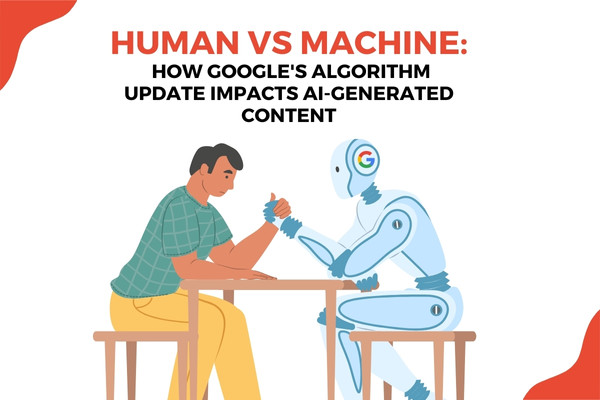
Human vs. Machine: How Google’s Algorithm Update Impacts AI-Generated Content
The battle between human writers and artificial intelligence (AI) content generators has taken a new turn. Google, the world’s most popular search engine, has updated its algorithm to detect and rank AI-generated content differently. This move has significant implications for content creators, publishers, and the future of online information.
Google’s algorithm updates are designed to enhance user experience by delivering more relevant and valuable content. As AI technology advances, the use of AI-generated content has become more prevalent. AI can generate articles, product descriptions, and even news reports with remarkable efficiency. However, Google’s algorithms are becoming increasingly adept at discerning between high-quality human-generated content and AI-generated content that may lack depth, originality, or coherence.
One significant impact of Google’s algorithm updates on AI-generated content is the emphasis on user intent and satisfaction. Google aims to prioritise content that best fulfils users’ search queries and provides them with the most comprehensive and helpful information.
While AI can produce content quickly, it may struggle to grasp the nuances of user intent and fail to deliver content that truly satisfies searchers’ needs. As a result, AI-generated content may be penalised in search rankings if it does not meet Google’s standards for relevance and quality.
Furthermore, Google’s algorithms are becoming increasingly adept at detecting and penalising content that violates its guidelines, such as keyword stuffing, plagiarism, and low-quality writing. While AI-generated content can be programmed to incorporate keywords and mimic human language, it may struggle to avoid these pitfalls consistently. As a result, AI-generated content that fails to adhere to Google’s guidelines may suffer in search rankings or even be removed from search results altogether.
The rise of AI content generators
In recent years, AI writing tools like ChatGPT, Jasper, and Anthropic’s Claude have gained immense popularity. These tools can generate human-like text on virtually any topic, from blog posts and articles to scripts and poetry. While AI content generators offer speed and convenience, they have also raised concerns about originality, authenticity, and the potential replacement of human writers.
Google’s AI content ranking update
Google’s latest algorithm update aims to address these concerns by identifying and ranking AI-generated content differently from human-written material. The search engine giant has not disclosed the exact mechanisms behind this update, but it is likely using advanced natural language processing and machine learning techniques to detect patterns and linguistic cues unique to AI-generated text.
Another aspect influenced by Google’s algorithm updates is the importance of authenticity and expertise. Google places a premium on content that demonstrates authority and credibility on a given topic. Human-generated content often reflects the insights, experiences, and expertise of its creators, which can establish trust with readers and signal to Google that the content is reliable. On the other hand, AI-generated content may lack the authenticity and depth that come from genuine human knowledge and understanding.
Impact on content creators and publishers
For content creators and publishers who heavily rely on AI writing tools, this algorithm update could significantly impact their search engine rankings and online visibility. AI-generated content that was previously ranking well may now be demoted, leading to a potential loss of traffic and revenue.
On the other hand, this update presents an opportunity for human writers to differentiate themselves and potentially gain a competitive advantage. Human-written content, with its unique voice, style, and originality, may be favoured and rank higher in search results.
Importance of authenticity and quality
Google’s move underscores the importance of authenticity and quality in online content. While AI writing tools can be useful for generating rough drafts or ideation, relying solely on them for publishing may no longer be a sustainable strategy. Content creators and publishers who prioritise human oversight, fact-checking, and unique perspectives are likely to fare better in the long run.
The future of content creation
As AI technology continues to evolve, the line between human and machine-generated content may become increasingly blurred. However, Google’s algorithm update serves as a reminder that human creativity, critical thinking, and the ability to connect with readers on a deeper level remain invaluable assets in the world of content creation.
Ultimately, the most successful content strategies will likely involve a harmonious blend of human and machine capabilities, leveraging the strengths of both to deliver high-quality, engaging, and authentic content to audiences worldwide.
